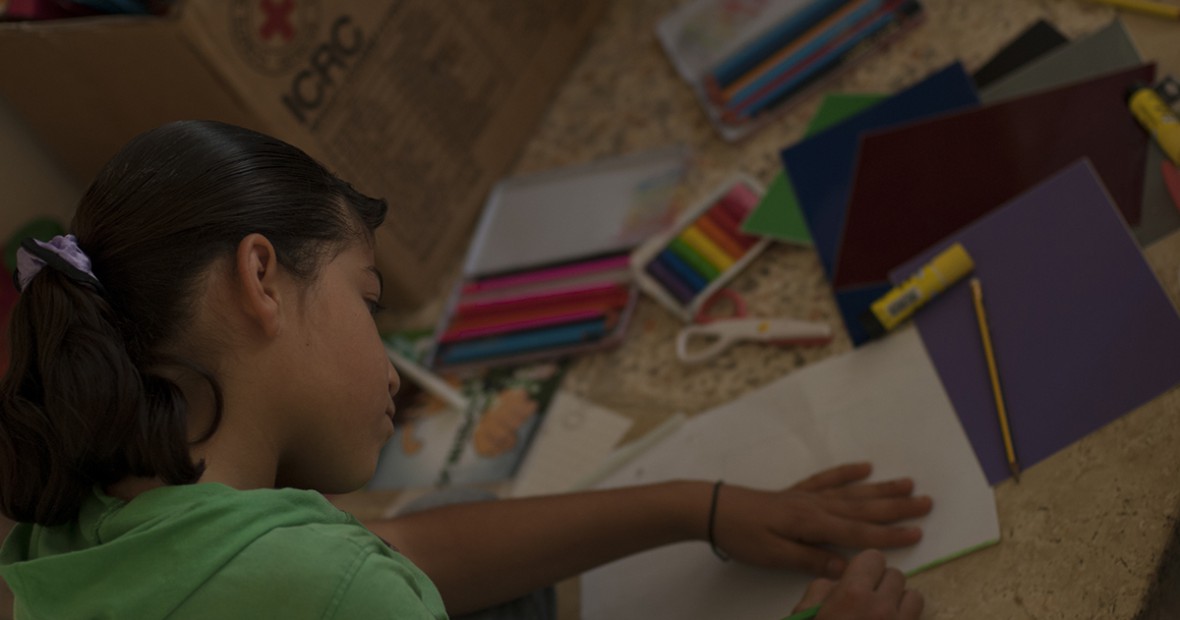Hostilities continue to cause frequent shortages of water, food and medicine affecting tens of thousands of residents and displaced people in Aleppo city and rural Aleppo. In recent weeks, the ICRC and the Syrian Arab Red Crescent have delivered much-needed medical supplies and other aid across front lines.
“Civilians across Aleppo and in nearby areas are still struggling to keep safe and obtain basic services such as health care,” said Boris Michel, head of the ICRC delegation in Syria. “We intend to continue to work with the parties, as we have been doing over the last three months, to maintain our access to people suffering the effects of the violence throughout the city and rural Aleppo.”
On 19 May, in a significant development, the ICRC received the authorization it needed to deliver food and other items for 60,000 people in eastern rural Aleppo and over 30,000 in Al Bab, Manbij and Greater Orm. No ICRC assistance had reached opposition-controlled areas in the previous nine months.
The ICRC has also provided medical supplies that will enable hospitals across Aleppo to treat up to 800 patients with weapon-wounded or other injuries. On 9 June, it delivered medical supplies to two hospitals in government-controlled Aleppo. On the same day, Syrian Arab Red Crescent personnel crossed into opposition-controlled parts of the city on foot to bring additional supplies to two local hospitals that have struggled to keep up with the constant influx of patients.
“Humanitarian needs across the governorate remain significant,” said Hind Akooly, the delegate in charge of the ICRC’s Aleppo and rural Aleppo operations. “We are standing by, ready to carry on with what we and the Syrian Arab Red Crescent started last month, but the parties must continue to grant us and the Red Crescent unhindered access to people harmed by the conflict, wherever they might be.”
Seeing to it that clean water is available for Aleppo residents remains a priority for the ICRC. The city has been facing a crisis since April, with millions of people regularly cut off from clean water. ICRC and Syrian Arab Red Crescent engineers are working together with local water boards to repair damaged infrastructure with the aim of improving people’s access to clean water over the medium term. In recent weeks, they have provided the Aleppo water board with generators, water pumps, decontamination consumables and water dispensers. The ICRC and the Syrian Arab Red Crescent have also installed toilets, taps and water pumps, and upgraded the pipe network at a temporary facility accommodating detainees recently transferred out of Aleppo Central Prison.
Providing emergency relief in an impartial manner also remains a priority for the ICRC in Aleppo governorate. The organization is once again calling on all parties to meet their obligations under international humanitarian law. In particular, they must spare civilian lives and facilitate the work of humanitarian aid workers.
Emergency relief
In May, the ICRC provided food for over 455,000 people in 11 governorates: Damascus, Rural Damascus, Dara’a, Quneitra, Sweida, Homs, Hama, Tartus, Latakia, Aleppo and Idlib. Most of the people receiving the aid were Syrians displaced within their own country. Nearly 6,000 people living in shelters for the displaced in Homs and Damascus had daily meals prepared for them in ICRC-supplied collective kitchens supported by the Syrian Arab Red Crescent. An additional 80,000 people displaced by the fighting were given hygiene items, blankets, mattresses, towels, water buckets, rechargeable flashlights, candles, cooking sets and other household essentials.
Water and sanitation
Since May, the ICRC has worked closely with the Syrian Arab Red Crescent and local water boards to provide:
- water trucking for over 100,000 people in Homs, Rural Damascus and Deir Ez Zor;
- support for rubbish removal in Idlib city, which has improved sanitary conditions for 100,000 people;
- clean water, proper sanitation and decent housing for 39,000 displaced people accommodated in 27 centres in Damascus, Rural Damascus, Dara’a, Homs, Raqqa, Aleppo and Latakia;
- repairs to the main water reservoir of Moadamiyat Al Qalamoun in Rural Damascus, which serves 120,000 people;
- technical support and supplies for Al Rabweh water project in Damascus, which makes water available to over 500,000 people living in Jdeidet Al Fadel, Moadamiya, Jdeidet Artous, Artous, Youssef Al Admeh, the March 8th complex, Darayya, Ashrafiyet Sahnaaya and Sahnaaya;
- repairs to the main water treatment plant in Raqqa city and a transformer at the governorate’s main water treatment plant, which together serve over 40,000 people;
- ten electric generators in Aleppo city, including in Al Muhallak, Al Sabil, and Al Shourta Garden.
Health
Since May, the ICRC has worked closely with the Syrian Arab Red Crescent to provide:
- medical supplies required to treat up to 800 patients at Al Razi and the military hospital in Aleppo city, and at Al Daqaq and Al Zarzour hospitals in the opposition-held areas of the city;
- financial support and supplies for seven Syrian Arab Red Crescent mobile health units and one outpatient care facility which together can provide health services for over 7,000 people every month.
Tracing and other services
Since May:
- the ICRC has provided nine people without valid identification with temporary travel documents, issued in coordination with the Syrian authorities and the UNHCR, enabling them to resettle outside Syria;
- the ICRC delegation in Damascus has received 115 tracing requests from people seeking to locate their relatives;
- the ICRC distributed one Red Cross message (a written message conveying news of a strictly personal nature to family members) and 15 salamats (oral messages to family members), mainly from Syrians abroad.
Syria is the site of the ICRC’s largest operation in terms of financial resources allocated. The organization has over 240 staff working in offices in Damascus, Aleppo and Tartus. It distributes food and other essentials, provides clean water, helps restore the water supply network where needed, and re-establishes contact between people separated by the conflict.


